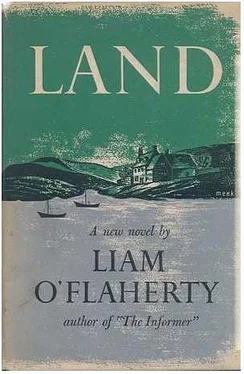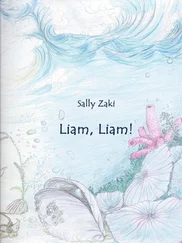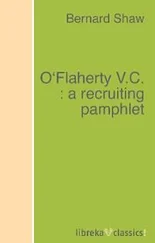Liam O'Flaherty - Land
Здесь есть возможность читать онлайн «Liam O'Flaherty - Land» весь текст электронной книги совершенно бесплатно (целиком полную версию без сокращений). В некоторых случаях можно слушать аудио, скачать через торрент в формате fb2 и присутствует краткое содержание. Город: London, Год выпуска: 2011, ISBN: 2011, Издательство: Bloomsbury Publishing, Жанр: Проза, на английском языке. Описание произведения, (предисловие) а так же отзывы посетителей доступны на портале библиотеки ЛибКат.
- Название:Land
- Автор:
- Издательство:Bloomsbury Publishing
- Жанр:
- Год:2011
- Город:London
- ISBN:9781448203888
- Рейтинг книги:3 / 5. Голосов: 1
-
Избранное:Добавить в избранное
- Отзывы:
-
Ваша оценка:
- 60
- 1
- 2
- 3
- 4
- 5
Land: краткое содержание, описание и аннотация
Предлагаем к чтению аннотацию, описание, краткое содержание или предисловие (зависит от того, что написал сам автор книги «Land»). Если вы не нашли необходимую информацию о книге — напишите в комментариях, мы постараемся отыскать её.
Land — читать онлайн бесплатно полную книгу (весь текст) целиком
Ниже представлен текст книги, разбитый по страницам. Система сохранения места последней прочитанной страницы, позволяет с удобством читать онлайн бесплатно книгу «Land», без необходимости каждый раз заново искать на чём Вы остановились. Поставьте закладку, и сможете в любой момент перейти на страницу, на которой закончили чтение.
Интервал:
Закладка:
“That’s not so,” Elizabeth said. “Whatever I did was through a sense of duty. That’s not enough. It breeds self-righteousness. Only what comes straight from the heart is really beautiful. That is why great sinners are often so lovable. Whatever they do, whether good or evil, comes right from their hearts.”
Tears came into her eyes and she looked at Lettice tenderly.
“Oh! I’m so grateful to you,” she continued, “for all you have given me, since you came into the house. God grant I may be able to repay you for your great bounty.”
Lettice came over to the bed and laid her hand gently against her aunt’s forehead.
“Try to compose yourself now,” she whispered. “I shouldn’t have let you do all that mending.”
Elizabeth took her niece’s hand and pressed it to her lips. Tears were rolling down her thin cheeks.
“You are an angel of love,” she whispered.
“Hush!” Lettice said. “Be quiet for a little while. I’ll finish mending that jacket.”
Like a child that fears a toy is going to be taken from it, Elizabeth clutched the jacket and her sewing needle.
“No, no,” she cried. “Let me finish it. I want to do it myself. I insist. There are only a few more stitches. Then I’ll be quiet. I promise you.”
“Very well,” Lettice said, returning to the basket.
Although it was very cold outside, with a blustering wind, a blazing turf fire in the grate made the room cosy and bright. Now and again, the naked tops of four young trees came into view beyond the window, as they bowed down slowly before the rush of the wind. Heavy waves crashed on to the beach at regular intervals. Seagulls cackled in harsh chorus as they soared over the house.
“There now,” Elizabeth said after a long silence, as she put down the mended jacket. “I’ve finished.”
Lettice continued to pack the clothes without seeming to have heard her aunt’s remarks. Her face looked very stern.
“Did I hear somebody come riding up the drive a little while ago?” said Elizabeth after another silence.
Lettice raised her head slowly and looked out the window.
“Father Costigan called,” she said solemnly.
“The cheek of him!” said Elizabeth angrily. “He must be entirely devoid of all decent feeling. Otherwise he would never dream of coming here, after what he did to Raoul.”
Lettice put the last of the clothes into the basket, fastened the lid and went out on to the landing to call Ahearn.
“You may come up now, Tim,” she said. “Ask Annie to come with you. The hamper is rather heavy.”
Then she went to the window and looked out over the sea. The foam-capped waves rolled on and on before the wind, in endless march. On the far horizon a black cloud hung low above the water. Rain was falling out there.
“What did Father Cornelius want?” Elizabeth said.
“He came to talk about Michael,” Lettice said.
The two servants entered. Elizabeth gave Ahearn instructions about delivering the hamper of clothes. This time he curtsied to her respectfully without speaking. Then the two of them picked up the basket and walked out of the room on tip-toe.
“Did he have any news?” Elizabeth said eagerly as the servants began to descend the stairs.
“Not of Michael,” Lettice said, turning away from the window.
“Oh! How I wish I could take your sorrow from you!” Elizabeth cried with fervour as Lettice walked slowly towards the fireplace. “It is unjust that one so deserving of happiness as you are should be …”
Lettice halted suddenly by the foot of the bed, thrust out her chin haughtily and said:
“Thank you for your kind intention, dear Aunt, but I assure you that I feel no sorrow.”
Elizabeth looked very hurt.
“Upon my word!” she said. “Sometimes you behave and speak exactly like your father.”
“Forgive me,” Lettice said as she moved again towards the fireplace.
Her carriage had lost its girlish exuberance. It now had the solemn dignity of mature womanhood.
“You’d be the most heartless of all creatures,” Elizabeth continued in a passionate tone, “if you didn’t feel sorrow when your husband is being hunted night and day like a wild animal.”
Lettice sat on a low stool by the fire and clasped her hands over her knees. Her hair looked dark red against the pale flames that rose from the burning turf.
“I suffer, but I feel no sorrow,” she said.
“What is the difference?” said Elizabeth. “What is the use of splitting hairs like that?”
“One feels sorrow when something is lost,” Lettice said, “or because of a pain that one bears against one’s will.”
“I insist that you are splitting hairs,” said Elizabeth. “I find that foolish and utterly useless. It would do you more good to pour ashes on your head and wail for all the world to hear your woe, like the wise women of the people do.”
“Why should I grieve for him?” Lettice said. “He is now living in the way he wants to live. He finds beauty only in danger. I suffer because I’m parted from him. That is all.”
Elizabeth leaned forward and stared intently at her niece for a little while. She had ceased to be irritated. Her eyes again looked tender.
“So you have heard nothing from him yet,” she said at length.
“No,” said Lettice.
“Not a single word since he went away that afternoon,” Elizabeth said.
“I didn’t expect to hear from him,” Lettice said calmly. “How cruel men are!” said Elizabeth.
“He is not being cruel,” said Lettice. “It’s just that we had already said farewell.”
“What do you mean?” said Elizabeth.
“It was after the storm,” said Lettice.
Elizabeth leaned back slowly against the pillows and said:
“Tell me about it, child.”
“It was on the fifth day of our honeymoon,” Lettice said gently, as she stared into the fire. “We had been wonderfully happy for four days on the tiny island to which he brought me in a pucaun. It was a naked rock, sitting alone on the sea, many miles from any other land. There were only thousands of large white birds, a strip of sand on which we beached our boat and a thatched hut once used by smugglers. The hut was perched on the very summit of the island, two hundred feet above the water. Michael’s comrades had repaired it for our visit. It was Indian summer for the first four days. Michael told me that the island fishermen call it ‘blue weather’ and that it was held sacred in ancient times to Ængus, the God of Love. Until quite recently, he said, mystical rites were performed in secret during ‘blue weather’ at many places along the coast. It’s not at all strange that people should worship such beauty. It truly had a divine quality. Everything was coloured an enchanting blue. The sea was transparent down to the very bed of the ocean. Each morning at sunrise, when we swam out side by side through the smooth blue water, we sang for joy. In the evenings, we sat outside our hut and built castles in the air, even though we already knew what the future held in store for our love. It was easy to forget and to make believe up there beneath the purple vault of Heaven and its myriad stars. On the morning of the fifth day, we rose to find that the ‘blue weather’ had vanished in the night. The sky had turned grey. There was a light breeze. Michael stood watching the sea for a long time in silence. He had been very gay, like a little boy on holiday, since our arrival at the island. Now his face was stark, as it had been when I saw him first, staggering into the kitchen. Dark balls of cloud appeared on the horizon, like puffs of smoke from guns that have just been fired. He turned to me and took my hands and stared at me steadily, without smiling or speaking. He kept pressing my hands. His own hands trembled. Finally he suggested that we go sailing. I was surprised and said to him: ‘Surely, it looks as if a storm were coming.’ He smiled and said: ‘Would you be afraid to sail with me through a storm?’ I told him that I would not be afraid. He then became excited and kissed me several times. ‘I have a reason for asking you to sail with me,’ he said. ‘I’ll tell you what it is afterwards.’ So we put the boat into the sea and hoisted the sail. When we cleared the mouth of the little cove, he gave full scope to the sail and we raced before the wind, which was already blowing strongly. The pucaun began to leap the rising waves like a hare going through long grass. We sailed ahead for more than an hour. By then it blew a hurricane. The waves came towering after us, always threatening to smother us and yet missing us by a hair’s breadth. Then Michael shouted into my ear: ‘We are now going to fight the storm.’ He lashed me to the stern and we raced on for a little while longer. He suddenly put about. I felt certain that we had foundered, because a giant wave passed right over me. I was nearly carried overboard, in spite of the stout rope with which I was tied. I lay breathless and unable to see for several minutes. When I recovered, however, I saw that we were still on an even keel, with our bow into the teeth of the wind. Michael grinned at me and we clasped hands. At once I felt a greater joy than I had ever known before. He had opened the innermost door and allowed me to enter. Then I understood what he had really meant when he said that Cape Horn was beautiful. I understood why beauty could be found in danger and why rapture could be dark as well as bright. We fought the hurricane for six hours, trying to push our tiny craft ahead in spite of the savage power pitted against it. During every moment of that time we treaded the brink of death. He gave me the tiller to hold several times, for a few moments, while he looked to the sail. That was very beautiful. Towards sunset, the hurricane had spent itself, but there was still a heavy sea. We couldn’t return to our island, so we made for Grealish. We were entering the roadstead when he took me in his arms and whispered: ‘Later on, when it’s time for me to go, remember that we have said farewell. This is our farewell. Promise me now that there will be no other.’ I promised him.”
Читать дальшеИнтервал:
Закладка:
Похожие книги на «Land»
Представляем Вашему вниманию похожие книги на «Land» списком для выбора. Мы отобрали схожую по названию и смыслу литературу в надежде предоставить читателям больше вариантов отыскать новые, интересные, ещё непрочитанные произведения.
Обсуждение, отзывы о книге «Land» и просто собственные мнения читателей. Оставьте ваши комментарии, напишите, что Вы думаете о произведении, его смысле или главных героях. Укажите что конкретно понравилось, а что нет, и почему Вы так считаете.












